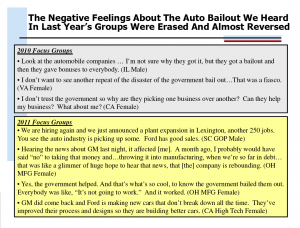Stimulus in Action, MI Edition
 I’ve said a couple of times here that Jennifer Granholm’s record as governor was better than I gave her credit for, particularly economically.
I’ve said a couple of times here that Jennifer Granholm’s record as governor was better than I gave her credit for, particularly economically.
The press is beginning to do some of the same reassessment. They’re discovering that, in spite of the Governor Engler tax cuts that made it harder to respond to MI’s downturn, Granholm did succeed in laying the groundwork for recovery.
But over the past year, a steady stream of economic statistics and research finds that Granholm is looking better in hindsight.
Here are some of the surprising Granholm highlights:
- Michigan tied with Minnesota for the nation’s largest decline in unemployment from 2009 to 2010. The state also experienced the nation’s sixth-largest increase in per-capita personal income in that same year-to-year period.
- State taxes as a percentage of personal income in 2011 are $7 billion lower than they were under John Engler in 2000. The fiscal problems the state faced were magnified by one statistic: Michigan’s overall tax revenues peaked during the prosperous year of 2000 and are not expected to return to that level until 2020.
- Though the Granholm-backed Michigan Business Tax — the so-called “job-killer” tax — was still fully in place, the state achieved a substantial bounce in manufacturing jobs in 2010, a trend that was projected to continue throughout 2011.
- Michigan ranks No. 1 in the nation for job creation improvement in a recent Gallup survey of state job markets, and Gov. Rick Snyder took office with some Granholm momentum that is expected to produce 64,600 jobs in 2011.
What this article doesn’t mention, of course, is that in addition to Granholm’s tireless effort to attract jobs and foster some diversity, MI also benefited from the massive government intervention of the auto bailout and received a number of grants that helped make possible factories like the Johnson Controls factory.
Speaking of which, here’s what the CEO of JCI, Steve Roell, had to say last Thursday about all the job creation Obama didn’t want to talk about.
Through innovation and investment in technology and people, Johnson Controls is a leader in the energy storage industry. We are investing more than $460 million in our advanced battery business for manufacturing and technical facilities here in Michigan and the U.S. These investments will lead to over 700 new jobs, retention of another 400, and provide approximately 1,000 construction workers.
We are doing that through several major efforts:
- We recently announced we will be converting our Toledo, Ohio-area plant to produce batteries for Start-Stop vehicles, which have been successful in the European market and will be introduced next year in the U.S. These batteries help reduce fuel consumption and emissions by 5-12% for internal combustion engine vehicles with little added cost to the consumer. This investment will retain 400 jobs, and create 50 new positions and 800 construction jobs.
- We recently opened our newly renovated Battery Technology and Testing Center in Milwaukee. It is the largest energy storage R&D center in the country, and we have added 60 new jobs. I’m pleased to say we just learned yesterday that Johnson Controls is receiving additional Department of Energy funding for research for developing green manufacturing processes and the next generation of lithium batteries.
- This facility in Holland will be the first in the U.S. to produce complete lithium-ion battery cells and systems for hybrid and electric vehicles, producing battery systems for U.S. based automakers, such as the Ford Transit Connect. Employment at this facility will be 320 people at full capacity. We have committed to building a second facility in the U.S. Once we identify a location, build the plant and get to full capacity, we expect to add nearly 300 additional jobs.
These projects are great examples of public-private partnerships that use innovation and technology to produce products that reduce fuel consumption and create jobs.
We are very grateful for the outstanding support we have received from the White House, the U.S. Department of Energy, the state of Michigan and the city of Holland for their vision in building an advanced battery industry for vehicles in the U.S. and for the financial incentives they have provided. [my emphasis]
Even perspectives on the auto bailout are improving (as the graphic above, from focus groups associated with this poll, shows).
Yet seemingly at the moment when attitudes about government investment in the economy are changing, the Obama Administration wants to pretend it never happened.
MI is by no means out of the woods yet (Governor Snyder’s cuts of both incentives and social benefits risk doing real damage). But it’s clear that it had started to turn around in 2009-2010. It’s clear that, partly because of government stimulus, what was then the basket-case of the US has started to turn around.
Yet for some reason, the government wants to avoid taking any lesson from this.